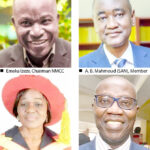Recently, at a time when Nigerians continue to pay higher taxes and suffer economic hardship, payments made to the criminal minority who are bandits, kidnappers, insurgents and militants are causing Nigerians to become less patriotic and justifiably disenchanted.
Undeniably, the current crop of leaders has failed to successfully address Nigeria’s myriad of social, economic, and political challenges. Last year, the nation earned itself the distinction of being the country with the largest number of people living in extreme poverty anywhere in the world.
As their economic condition worsens, an increasing number of Nigerians are expressing their frustrations with the oppression, suffocation, intimidation, bullying and general mistreatment by the government and the social elite.
The goal of every administration should be to govern in such a manner as to bequeath to the next generation a country that is better off than the one they met. In this respect, the current leadership has done a poor job as all the indices for development are negative. This administration is on course to leave the next generation with massive debts, few prospects, no generally accepted national development plan, and little national cohesion.
Despite Nigeria being endowed with a surfeit of human and material resources, all the indicators of human misery are domiciled in the country. The problems didn’t start today; they are a culmination of the 60 years of being “blessed” with “God-sent” leaders who don’t listen, don’t reason correctly, don’t sympathise with the plight of the people, and see the accumulation of wealth as their primary purpose in office.
Nigerian political leaders are fond of continuously referring to the nation as the “Giant of Africa”, despite the fact that all the post-independence coups, counter-coups, regime changes, fraudulent elections, and recycled rulers have only made things progressively worse. Future generations will have a monumental task ahead of them to rectify matters and fulfil the aspirations of citizens understandably disillusioned by democracy and lack of meaningful development.
The antics of senior political office holders and major actors seriously retard the nation’s progress and must be roundly condemned. They care not that they are despised as people who get paid humongous sums not for working hard and concentrating their efforts on solving the nation’s problems, but for being carried away with the trappings of power, routinely attending various social functions, travelling out of the country, and gallivanting around the nation in private jets mostly procured with the nation’s misappropriated wealth.
They care less about the minimum wage remaining abysmally low, inflation being rife and the majority of ordinary citizens not having access to clean potable drinking water or standard medical facilities. Most distressing of all is that because there are no concrete plans for the government to create mass employment, an increasing number of Nigerians are resorting to law-breaking just to survive.
Regrettably, the current administration is not proactive in solving problems and only takes belated action when the situation gets out of hand and the public outcry is too much. Recent events leave no room for doubt that Nigeria’s constitutional democracy is in extremely poor health. In spite of an ever-increasing budget for security, the nation is overrun by bandits, terrorists and insurgents. Current leaders simply don’t understand or fully appreciate the gravity of a situation in which Nigeria is to all intents and purposes currently at war. They now strive to buy “peace” by appeasing criminals and silencing those who legitimately protest. They do not appreciate that the world is changing and the old order can’t last for much longer.
The choice before Nigeria is either to restructure or risk disintegration. It’s a myth that Nigerians have no other choice but to remain one united nation even if no real effort is made to make it so. Those who consistently claim that “unity is non-negotiable” are not the owners of Nigeria, and they do not take into account the aspirations of the people, whose patriotism has been vastly eroded due to the nepotism and ethnic bias of this administration. Lessons must be learnt from the nation’s history. To effect real change, it’s important to know how we got here and what needs to be done about it especially as the current political class is both unwilling and incapable of bringing about the required and much-touted change.
They are consumed by protecting their immoral unjustifiable remunerations and luxurious lifestyles at public expense. They have become negligent in their sworn duties to uphold the constitution and better the lot of the people. Educationalists continuously assert that the major reason for this national negligence of duty is the failure of the Nigerian educational system to place emphasis on civic education.
The national policy on education continues to focus on numerical and technical skills rather than societal skills. As a result, university graduates engage in armed robbery, advance fee fraud and other get-rich-quick activities to the detriment of societal cohesion and national development.
Political leaders appear oblivious to the fact that if the nation wishes to compete on the world’s stage as a constitutional democracy, it can only do so if there are patriotism and civic strength amongst citizens. There needs to be a concentrated effort to promote the virtues in civic education for future generations to support the knowledge and skills needed for a healthy republic. Indeed, a credit in civic education for national cohesion and development should be made compulsory for university admission.
Nigeria must strive to ensure that all the nation’s youths are taught not to obey without question but to understand, appreciate, productively use and debate the nation’s form of government and civic life. They must be able to directly address issues of Nigeria’s foundations from the earliest colonial period to the present. They must be inspired to want to become involved in Nigeria’s constitutional democracy; they must learn to understand the need for compromise which makes constitutional democracy work. They must cultivate civic honesty and patriotism that leaves space both to love and to critique the country. They must be able to productively debate disagreements on differences in identity, viewpoint and geography so that they can achieve consensus about how the nation should develop in future.
It is also important that history is made compulsory in schools so that future generations do not repeat the mistakes of the past. Quite understandably, there is deep disagreement about Nigeria’s post-independence history and whether to emphasise triumphs and achievements or wrongs and crimes of commission or omission. It should be both because it is important that the truth be known to everyone. Life is not about agreeing all the time, but rather about how to handle disagreement. At the end of the day, the real key which will determine if Nigeria remains one will be civic education to answer the question of whether we can learn to disagree productively.

 Join Daily Trust WhatsApp Community For Quick Access To News and Happenings Around You.
Join Daily Trust WhatsApp Community For Quick Access To News and Happenings Around You.


